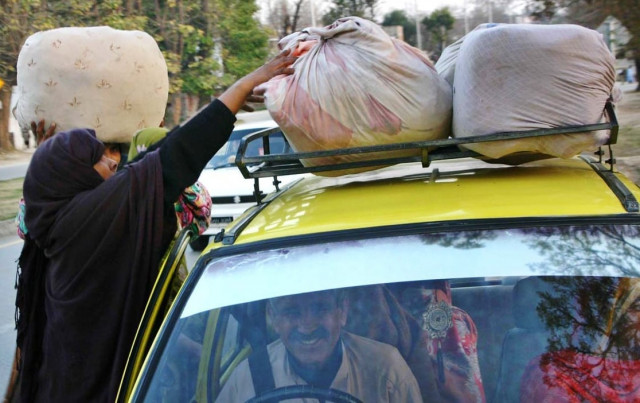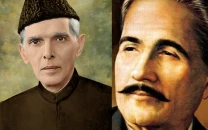Taxi! Taxi!: Who’s in the back seat?
In Pakistan, cab drivers routinely face a host of security problems, making this a dangerous vocation.

In Pakistan, cab drivers routinely face a host of security problems, making this a dangerous vocation. PHOTO: APP
Ikhtiar Gul, 40, is a burdened man. As a poor taxi driver in Peshawar, it has always been difficult to make ends meet.
But now, things are worse. A few months back, his 27-year-old brother-in-law, also a taxi driver, was shot dead by bandits in Zangli. Now, Gul is left to care for his sister and her three children, two of them mentally challenged.
“Three bandits posed as passengers and asked Ghareeb Khan to take them to Kohat,” narrates Gul. “Then, just as they arrived in Zangli, they asked him to park and hand over the keys. When he resisted, they opened fire. We lost Ghareeb.”

After the murder, the police informed the media that it was a crime based on a personal enmity. However, Gul’s family found out about the bandits from other taxi drivers at the stand.
“The police often label such killings as being based on personal enmity,” says Hafizul Haq Hasanzai, president of the Karachi Rickshaw, Taxi and Yellow Cab Owners Association, adding that attempted robberies and acts of terror are often cloaked this way, in a bid to avoid a drawn out investigation process.
Living on the edge
Due to the nature of their work, taxi drivers are victims of crime more often than the average person. At the taxi stand, just about anyone can get into the back seat of an available cab. And yet, many believe there is no gain without risk when it comes to this profession. Javed Zaidi, who was badly beaten up in Karachi’s Landhi neighbourhood, says he continues to drive in the area.
“For us cabbies, lawlessness and safety problems are the biggest issues in the city,” he says. “However, I have been in the profession for 30 years. I continue to drive because there is always risk.”
In a similar vein, Waseem Jan, who has been driving his taxi in Peshawar for 14 years, says vehicle robbery is a huge concern in the province.
“Four friends of mine have been killed in this manner,” he says sadly.
Conversely, Muneer Ahmed, 38, thinks that by being a little prudent, many ills of the profession can be avoided. “I am Bengali and good at judging people,” says the driver, who works mainly in upscale Clifton. “I don’t pick up strangers and prefer picking up people from my area. I earn between Rs1200 to Rs1500 per day and I am quite happy with it.”
Renouncing the vocation
The safety issues, coupled with little governmental support, lead many to change professions. “My taxi was set on fire in Buffer zone many years ago. I was never compensated by the government,” remarks 55-year-old Parvez. “Honestly, I never had the money to buy a taxi after that, so I started working in a hotel.”
Meanwhile, according to Hasanzai, the association cannot compensate drivers if their taxis are destroyed, as it does not accept donations.
“There are affluent people who help taxi drivers, if need be,” he says.
Blight of unreliability
Along with security concerns, taxi drivers also deal with a host of other problems: they do not earn regular wages, work uncomfortable timings, and face increasing gas prices.
“The amount we make is all up in the air. Some days, things are great. Some days, we are not as lucky,” says Zaidi.
Work hours are also an issue. “We pick up passengers until midnight, or even past that,” says Muhammed Rafiq, 41, who has been driving for the past 19 years. “We work well into the night, often travelling with passengers under the influence of drugs and alcohol. However, I am not afraid of them. They always pay more, as they are out of their senses.”
Hasanzai adds that it is unfair how many taxi drivers in Karachi only get work 15 to 20 days a month due to shutter-down strikes. He says there are 32,000 yellow and black cabs in the city alone.
In Islamabad, the drivers are worried about the CNG prices. According to Malik Aftab, who says there are over 12,000 registered taxis in Islamabad and 35,000 registered taxis in Rawalpindi. The Islamabad High Court has banned cylinder in public transport. This, for many drivers, is very worrisome.
Published in The Express Tribune, July 1st, 2013.



















COMMENTS
Comments are moderated and generally will be posted if they are on-topic and not abusive.
For more information, please see our Comments FAQ